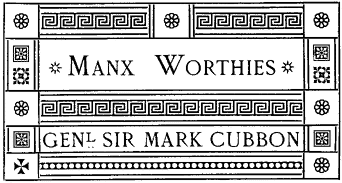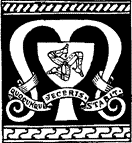
[from Manx Note Book, vol 1, 1885]

 ARK CUBBON WAS BORN IN THE VICARAGE OF MAUGHOLD, 23 RD AUG., 1775.
HIS FATHER WAS THOS. CUBBON, afterwards Vicar-General; his mother,
Margaret Wilks, daughter of the Rev. James Wilks, Rector of Ballaugh,
and sister to Col. Mark Wilks. They had ten children, of whom Mark
was seventh. As a boy he enjoyed scrambling over the hills and rocks
of his native place, and in after life he retained an extraordinary
delight in ascending hills. Frequently, when in camp, the bugle
sounded at half-past two, when all walked for an hour, then rode till
day-break, when, accompanied by others, he would ascend some
neighbouring hill, and return to breakfast. In early life he attended
the Parochial School, and then went to Mr Maddrell in Ramsey, of whom
he said afterwards, " I wish he had taken more pains to thrash Latin
into me." His uncle, Col. Wilks, wrote to his father from London on
the eve of his departure to India, before he was Acting Resident of
Mysore, saying he had prepared matters so as to have Mark enrolled as
a cadet, and that he would have to leave England in the spring of
1802. He had to start earlier than was expected and arrived at
Calcutta in the summer of 1801. When qualified he was appointed to
the 2nd Madras Battalion, and in July 1804 to the 2nd Battalion 5th
Native Infantry, and served with the Field forces commanded by Col.
Chalmers, in Travancore. He had an enthusiastic admiration for the
Sepoys and respected their religious prejudices. He expressed a
soldier's pride in his Battalion as the best disciplined on the
Coast, and said that General Sir John Craddock told them that they
should take the field in preference to any other if the new war broke
out. In 1809, he received a civil appointment. At this time there was
great disturbance in the army. Sir G. Barlow had succeeded the
Marquis Cornwallis as Governor, and among other acts he proposed a
pledge to all officers to obey his orders and support his government,
or be removed from all military functions. When the pledge arrived at
Mysore the officers refused to sign it and many of the oldest and
best were dismissed. When the pledge was presented to Sir Mark, his
reply was, " I have read the declaration proposed by the Governor for
the signature of the officers, but as the required pledge involves
the necessity of acting against my brother officers I beg leave to
decline it." In a letter to his uncle he said, "I cannot bring my
feelings to act against my brother officers, nor will I, for
mercenary considerations, afford assistance in executing measures
which I detest against officers whom I love. I know not which
deserves most censure, the conduct of Sir G. Barlow or that of the
army, nor did I approve of either, and holding these principles I
lost my appointment." In 1810, he was appointed to the Commissariat
Department and served with the Field forces under Col. Close, in the
Nerbudda Country, as afterwards with those under Major-General
Taylor, in the Kurnool. Next year he was appointed Assistant
Commissary-General, " a distinction," he says, " far above my rank or
claim on the service. I have been appointed to the most delightful
Cantonment and attached to the largest field force under this
Presidency; I must consider myself one of the most fortunate young
men in it, although I am unlucky in my Regimental promotion." In
1827, he succeeded Sir William Morrison as Commissary-General, on his
appointment to the Residency of Travancore.
ARK CUBBON WAS BORN IN THE VICARAGE OF MAUGHOLD, 23 RD AUG., 1775.
HIS FATHER WAS THOS. CUBBON, afterwards Vicar-General; his mother,
Margaret Wilks, daughter of the Rev. James Wilks, Rector of Ballaugh,
and sister to Col. Mark Wilks. They had ten children, of whom Mark
was seventh. As a boy he enjoyed scrambling over the hills and rocks
of his native place, and in after life he retained an extraordinary
delight in ascending hills. Frequently, when in camp, the bugle
sounded at half-past two, when all walked for an hour, then rode till
day-break, when, accompanied by others, he would ascend some
neighbouring hill, and return to breakfast. In early life he attended
the Parochial School, and then went to Mr Maddrell in Ramsey, of whom
he said afterwards, " I wish he had taken more pains to thrash Latin
into me." His uncle, Col. Wilks, wrote to his father from London on
the eve of his departure to India, before he was Acting Resident of
Mysore, saying he had prepared matters so as to have Mark enrolled as
a cadet, and that he would have to leave England in the spring of
1802. He had to start earlier than was expected and arrived at
Calcutta in the summer of 1801. When qualified he was appointed to
the 2nd Madras Battalion, and in July 1804 to the 2nd Battalion 5th
Native Infantry, and served with the Field forces commanded by Col.
Chalmers, in Travancore. He had an enthusiastic admiration for the
Sepoys and respected their religious prejudices. He expressed a
soldier's pride in his Battalion as the best disciplined on the
Coast, and said that General Sir John Craddock told them that they
should take the field in preference to any other if the new war broke
out. In 1809, he received a civil appointment. At this time there was
great disturbance in the army. Sir G. Barlow had succeeded the
Marquis Cornwallis as Governor, and among other acts he proposed a
pledge to all officers to obey his orders and support his government,
or be removed from all military functions. When the pledge arrived at
Mysore the officers refused to sign it and many of the oldest and
best were dismissed. When the pledge was presented to Sir Mark, his
reply was, " I have read the declaration proposed by the Governor for
the signature of the officers, but as the required pledge involves
the necessity of acting against my brother officers I beg leave to
decline it." In a letter to his uncle he said, "I cannot bring my
feelings to act against my brother officers, nor will I, for
mercenary considerations, afford assistance in executing measures
which I detest against officers whom I love. I know not which
deserves most censure, the conduct of Sir G. Barlow or that of the
army, nor did I approve of either, and holding these principles I
lost my appointment." In 1810, he was appointed to the Commissariat
Department and served with the Field forces under Col. Close, in the
Nerbudda Country, as afterwards with those under Major-General
Taylor, in the Kurnool. Next year he was appointed Assistant
Commissary-General, " a distinction," he says, " far above my rank or
claim on the service. I have been appointed to the most delightful
Cantonment and attached to the largest field force under this
Presidency; I must consider myself one of the most fortunate young
men in it, although I am unlucky in my Regimental promotion." In
1827, he succeeded Sir William Morrison as Commissary-General, on his
appointment to the Residency of Travancore.
After the capture of Seringapatam a separate government was formed of Mysore and invested in the hands of two Commissioners; but in 1834, Sir William Bentinck appointed Sir Mark sole Commissioner, with large discretionary powers. Such was the confidence reposed in him that no Governor or Chief-Commissioner had such unfettered power committed to him. He occupied this post till 1860, a period of twenty-six years, during which time the history of the Province "is that of a people made happy by release from serfdom and of a ruined state restored to financial prosperity." In 1856 he received the honour of K.C.B. During the dreadful insurrection of 1857, the territory of Mysore was maintained in perfect tranquility. In 1859, the Governor-General wrote, " The service you have rendered to the state in connection with the administration of Mysore for nearly a quarter of a century are, as they have always been, most highly appreciated by the Government. These services were a few years ago marked by the special approbation of the Queen, and the Governor-General freely and gladly concedes to you the high merit of having subsequently during the late crisis, and in the midst of difficulties which you have in no way exaggerated, kept the Provinces under your charge in perfect tranquility. The value of your services to those Provinces, and the honour and esteem which, by your high character as well as by your administrative ability and success, you have won from every branch of the community, European and Native, stand on record and can never be forgotten by the Supreme Government." In the next year orders were issued to transfer the superintendence of Mysore affairs from the Governor-General to the government of Madras. When Sir Mark heard of this he sent in his resignation, as he held it to be contrary to the declaration made by the Honourable Court of Directors in 1838. When the people heard of his resignation they prayed Lord Canning not to accept it, and the order was withdrawn. At the beginning of the next year he felt compelled to resign owing to ill-health. He left India in April,1861,and died at Suez on the 23rd. His remains were brought home by Dr. Campbell, who had attended him on the voyage, and interred in Maughold Churchyard, May 17th.
When the tidings of his death reached Mysore all public offices were closed, and all public business throughout the Mysore territory was suspended for three days. A large sum was raised to erect a memorial; and an equestrian statue was ordered from Baron Maroschetti, which was unveiled on the 16th of March, 1866, in the presence of an immense assembly. Mr Bowring, who had succeeded him, gave an address expressing his admiration of the abilities and high character of his illustrious predecessor.
S. N. HARRISON.

|
|
||
|
|
||
|
Any comments, errors or omissions
gratefully received The
Editor |
||